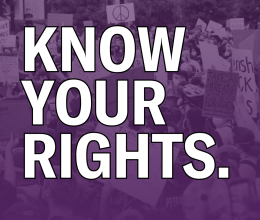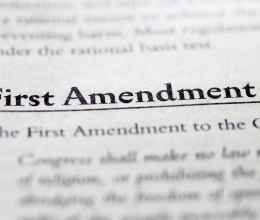Council of the District of Columbia
John A. Wilson Building
1350 Pennsylvania Ave. NW
Washington, D.C. 20004
Dear D.C. Councilmembers,
On October 28, 2024, bills 25-1012 and 25-1013, the Residential Tranquility Emergency Amendment Act of 2024 and the Residential Tranquility Temporary Amendment Act of 2024, respectively, were introduced. These bills have not been the subject of a public hearing or roundtable, yet the Council is planning on voting on these measures today without time for robust discussion or public input. The American Civil Liberties Union of the District of Columbia (ACLU-D.C.) urges councilmembers vote no on both the emergency and temporary versions of this legislation. If Councilmembers chose to move the legislation, we urge that the Council consider amending the legislation to cure potential constitutional concerns.
While the ACLU-D.C. understands the concerns at stake, it is our position that any bill that seeks to restrict people’s First Amendment activities should not be rushed and should receive full deliberation. In the case of the Residential Tranquility Emergency Amendment Act of 2024 and the Residential Tranquility Temporary Amendment Act of 2024, the noise in residential neighborhoods the bills seek to curtail is already prohibited. The Council should urge the Chief of Police to enforce the District of Columbia Noise Control Act in a constitutionally adherent manner, rather than adopt additional legislation.
Under the D.C. Noise Control Regulations, it is the “declared public policy of the District that every person is entitled to ambient noise levels that are not detrimental to life, health, and enjoyment of his or her property.” To that end, it is already unlawful to use a device to create noise louder than 60 dB(A) in a residential area during the day or louder than 55 dB(A) at night (defined at 20 DCMR 2799.1 as the period from 9 p.m. to 7 a.m.). Even if noise does not exceed these specific limits, it will still violate the regulations if it constitutes a “noise disturbance,” defined as “any sound which is loud and raucous or loud and unseemly and unreasonably disturbs the peace and quiet of a reasonable person of ordinary sensibilities in the vicinity thereof, unless the making and continuing of the noise is necessary for the protection or preservation of the health, safety, life, or limb or some person.”
The existing regulations provide the District authority to address excessive noise in residential areas is reason enough not to rush through duplicative protections. Worse, the restrictions proposed in the legislation are not merely duplicative but go further in restricting speech and in doing so raise several concerns.
First, the bills include a provision that, if passed, would limit all sound amplification devices when used by protestors targeting a residence within specific zones even outside the restricted hours of 7pm and 9am. This prohibition against the use of an amplified sound in a residential neighborhood at all times may be interpreted by a court as an unreasonable regulation of time, place, and manner. We have concerns with this overly restrictive language. An amendment is needed to ensure that the current language does not wholly prevent this activity at all hours of the day, but rather, ensure these activities are only being limited between the hours of 7pm and 9am, the window proposed elsewhere in the bills.
Second, the bills could be interpreted to apparently prohibit demonstration noise when the same level of non-demonstration noise might be allowed. But prohibiting expressive activity “while at the same time allowing conduct completely unrelated to the First Amendment, yet equally annoying, to continue unabated . . . stands the First Amendment on its head.”
Third, we propose the Council add language that explains how a law enforcement officer should clearly ask a group to disperse; we urge the Council to adopt language similar to D.C. Code § 5–331.07(e)(1)(A).
Fourth, we propose Council exclude automobile audio systems altogether in its definition of “sound amplifying device” and strike the language that limits the exclusion of audio systems “when used and heard only by the occupants of the vehicle in which the automobile audio system is installed.”
Finally, we understand that the bills do not intend to proscribe noise from passers-by, whether demonstrators or not, if they are not targeting a residence in a prohibited zone. The bills should explicitly state this exclusion by including language that clearly states that the limits on using sound amplification devices should not apply to people in non-residence targeting demonstrations that are passing by a residence or through a neighborhood.
Both the Residential Tranquility Emergency Amendment Act of 2024 and the Residential Tranquility Temporary Amendment Act of 2024 should go through the ordinary legislative process so District residents can consider what the bills propose. We urge councilmembers to adhere to democratic principles of debate and transparency and to not rush to pass emergency legislation that can affect one of our most fundamental rights. If there is further interest in the proposed legislation, we urge the Council to re-introduce it in the next Council Period and schedule a public hearing where the bill and its merits can be explored and discussed.
Should Council choose to move the legislation, we urge it to amend the legislation as outlined herein. Without these significant amendments, we urge the Council to vote NO on Bill 25-1012 and Bill 25-1013.


